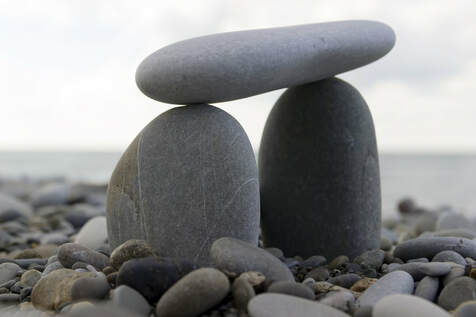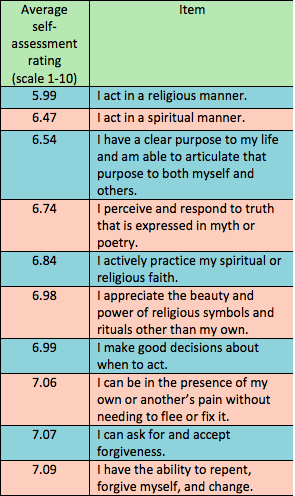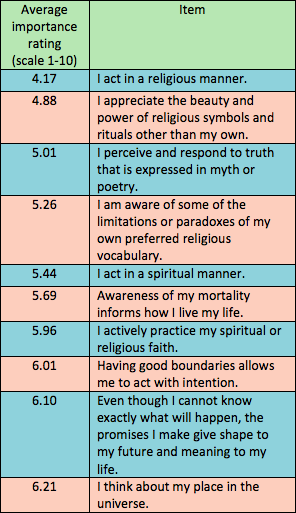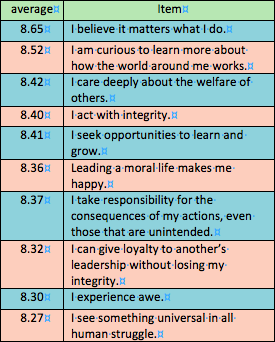|
Wondering how you might deepen your spiritual life using your Spirit Map results? The practice below invites you to consider how your Signature Strengths (SS) and Key Opportunities (KO) come into relationship, and comes from Sarah Cledwyn of Grow Soul, Spirit Map's Spiritual Direction Consultant.
Take a look at your Signature Strengths and Key Opportunities. Are there any that you feel are a pair or go together? Let the two statements take on a bit of personality and have a conversation. Assign your Key Opportunity to your non-dominant hand and your Signature Strength to your dominant hand. See what they have to say to one another. Have them ask each other good questions. How do they answer one another? For example, take the pair: SS - I care deeply about the welfare of others. KO - I give to others fully and generously Your KO hand might ask your SS hand:
0 Comments
We’ve been sharing what we’ve learned about the 768 people who’ve completed the Spirit Map inventory so far (see this post and this post). In this post, we consider what items people identify as least true of them and least important* to them:
One pattern worth noting is how many items on both lists relate to living the spiritual or religious life. Acting in a spiritual or religious manner is less true of and less important in the spiritual lives of the people who have taken Spirit Map so far, despite the fact that most of them belong to a religious community. Their sense that acting in a spiritual or religious manner is less true of them and less important to them seems consistent with the trend that an ever-increasing number of Americans say they have no religious affiliation (currently 22.8% of the US population, according to Pew Research).
If you’re a congregational leader, this could represent an opportunity to reclaim the meaning of the spiritual and religious life by explicitly connecting spiritual and religious practice to what people identify as most true of them (see this post) and most important to them (see this post). This could help renew faith practice by connecting it to what people find particularly relevant for them today. For example, one item that people rate as more true of them and more important to them is “I act with integrity.” To help people connect this statement with their spiritual and religious lives, you might help them consider such questions as:
If you’ve done Spirit Map in your congregation and found this same pattern, you might also want to invite people to explore why they rated those items lower and see what additional insights you can gain from their reflections. What other patterns are you seeing in these lists? What other opportunities do these items present? Leave your reflections in the comments! Sarah Cledwyn of Grow Soul, Spirit Map’s Spiritual Direction Consultant, offers a short practice to reflect on “I act in a religious manner” and its meaning in your own spiritual life: Take a moment to become centered and calm. Perhaps settle into the surface you are sitting on and notice and feel the support it provides you. Now contemplate the phrase, "I act in a religious manner" and see what rises. Without judgement, notice what happens in your body and mind as you sit with this phrase. Simply observe. You may want to journal in a stream of consciousness way about what comes up for you. What do you notice? Are there negative associations? Are there well worn stories that arise? When this exercise feels complete or you have opened some insight for yourself, return to a centered and calm space, again noticing the support of the surface you are sitting on. Now repeat the exercise with this phrase, "I experience faithful devotion to an ultimate reality". Again, without judgement, notice what happens as you slowly sit with this phrase. What happens in your body and your mind? When this feels complete, come back to calm and sit with the phrase, "I am scrupulously and conscientiously faithful". Again notice. When you have sat with and witnessed all three phrases, wonder a little about the reactions that came up for you. Did replacing "religious" with dictionary definitions shift focus for you? Out of these 3 phases, is there one that feels more important and true for you? Why? Where do you find the intersection of what’s true of you and what’s important to you in your spiritual life? Take the Spirit Map inventory yourself and see! You can purchase a Spirit Map report, which gives you full access to the inventory, or you can try a sample inventory. Or, explore our website to learn more about us. *It’s important to note that we ask people to rate the relative importance of the Spirit Map items, which means that when someone says an item is relatively less important it does not mean that item is necessarily unimportant to them. **We have four sources for the data that make up these averages. Three data sets come from three Unitarian Universalist congregations, one in Minnesota (n=248), one in Colorado (n=302), and one in Massachusetts (n=133). The fourth data source is from individuals who have independently taken the Spirit Map survey (n=85). Every person who completes the Spirit Map inventory rates the 44 Spirit Map items two ways, using a scale of 1 to 10. 1. How true is this statement of you today? 2. How important is this statement in your spiritual life? What do people say is most true of them? Here are the top ten items, based on average ratings from the 768 people who have completed the Spirit Map inventory so far: What might we learn from what's true of us collectively?
First, it’s worth considering whose data makes up these averages. We have four sources. Three data sets come from three Unitarian Universalist congregations, one in Minnesota (n=248), one in Colorado (n=302), and one in Massachusetts (n=133). The third data source is from individuals who have independently taken the Spirit Map survey (n=85). Even though this is obviously not a random sample, could we learn something interesting or useful about the people who have taken Spirit Map so far? When we look at these top ten most-true items, we see people comfortable with many forms of action in spiritual well-being, particularly that their actions are aligned with their values and principles. Five of these statements speak to this theme:
We also see people comfortable with the open curiosity that can aid spiritual growth and development, seen in two of the statements:
And we see people who balance an inward focus with looking outward to the situation of others, seeing themselves as part of a larger whole:
Only one of the top ten most-true statements speaks to the religious experience itself: I experience awe. What might it mean for people to be more broadly connected to the vulnerability and humility one finds in the experience of the holy? Could a broader connection to mystery and wonder, to that which is larger than ourselves, more fully ground people for the action that expresses their spiritual values, action the people who’ve taken Spirit Map already see as true of them? Sarah Cledwyn of Grow Soul, Spirit Map’s Spiritual Direction Consultant, offers a short practice to take one of these statements and bring it deeper into your experience: I have had the pleasure to work with many people who have taken Spirit Map and recognized in the results something that rang very true for them. I have also had the honor to lead them deeper into what the results mean for them and how they play out concretely in their lives. This is the real power of the inventory. The universal statements of Spirit Map capture a high level view of strengths and opportunities which come into their most beautiful expression in the details of a lived experience. Within our lived experience, we can gain awareness that enables us to live even more deeply into our strengths and to explore and lean into our opportunities. Here is a practice you can try: As you look at this top ten list, are there any that deeply resonate for you? Choose one that has the most energy for you and sit with how this expresses itself in your life. Remember a specific time where you embodied this statement. Re-tell this story to a trusted friend, spiritual director, or simply journal it for yourself. After re-telling the story reflect on:
What's most true of you? Take the Spirit Map inventory yourself and see! You can purchase a Spirit Map report, which gives you full access to the inventory, or you can try a sample inventory. Or, explore our website to learn more about us. |
What's HereInsights we've gained from Spirit Map. Archives
May 2020
Categories
All
|





 RSS Feed
RSS Feed